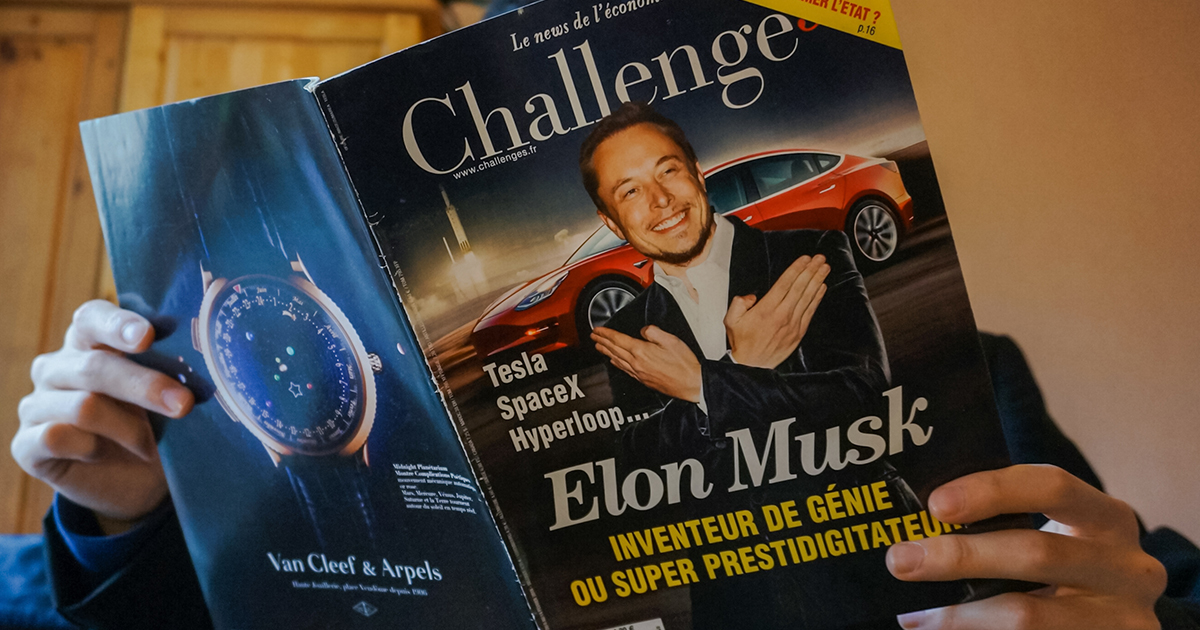Articles
Six Innovations By Elon Musk

Elon Musk is perhaps the boldest business leader, thinker and entrepreneur of this generation. Elon Musk dabbled in multiple ventures over the years and most of them might seem like they are straight out of a storybook. Elon Musk’s perseverance to achieve his dreams have paid off and he now owns several highly successful companies. Elon’s ambitions are bold as he is determined to send humans to Mars, offer highly subsidised or free internet to the world and develop the world’s fastest mode of transportation with his ventures.
We give you six innovations conceived by Elon Musk which prove he is a true visionary.
1) Tesla
Tesla is a car manufacturing firm which mainly focuses on cars which run on electricity powered by batteries. The company name Tesla, is a tribute to Nikola Tesla who was an electrical engineer. Elon Musk’s Tesla pioneered the concept that electric cars can look and feel like premium cars as well as powering their vehicles with powerful artificial intelligence which lets its drivers to sit back and relax while the autopilot does the driving. Tesla cars are only sold online as Elon Musk believes a traditional dealership will have conflict of interests while selling electric vehicles. Tesla is the first automaker that sells cars directly to consumers while the rest use independently owned dealerships.
2) SpaceX
Space X is perhaps the most ambitious undertaking by Elon Musk as he believes colonising Mars is the future of humankind. SpaceX is also short for space exploration and has drastically reduced the costs of undertaking space missions as Elon Musk figured out a way to reuse the rockets. Unlike most rockets, which are expendable launch systems, since the introduction of the Full Thrust version, Space X’s Falcon 9 is partially reusable, with the first stage capable of re entering the atmosphere and landing vertically after separating from the second stage. This feat was achieved for the first time by SpaceX in December 2015. A 2011 NASA report “estimated that it would have cost the agency about US $ 4 billion to develop a rocket like the Falcon 9 booster based upon NASA’s traditional contracting processes while “a more ‘commercial development’ approach might have allowed the agency to pay only US $ 1.7 billion (sic.)”
3) Hyperloop
Hyperloop aims to be the provider of the fastest mode of transportation on the planet. Hyperloop is a sealed tube or system of tubes with low air pressure through which a pod may travel substantially free of air resistance or friction. The Hyperloop could convey people or objects at airline or hypersonic speeds while being very energy efficient. In aerodynamics, a hypersonic speed is one that greatly exceeds the speed of sound, often stated as starting at speeds of Mach 5 and above. Mach 1 is the speed of sound which is 1234 kmph. The Hyperloop Genesis paper conceived of a hyperloop system that would propel passengers along the 350-mile (560 km) route at a speed of 760 mph (1,200 km/h), allowing for a travel time of 35 minutes, which is considerably faster than current rail or air travel times.
ALSO READ: Five Interesting Facts About Elon Musk’s SpaceX
4) Starlink
Starlink is a satellite constellation being constructed by SpaceX to provide satellite Internet access. The constellation will consist of thousands of mass produced small satellites in low Earth orbit (LEO,) working in combination with ground transceivers. SpaceX intends to provide satellite internet connectivity to underdeveloped areas of the planet, as well as provide competitively priced service to urban areas.
5) Boring company
The Boring Company is a tunnel services company and Elon Musk cited difficulty with Los Angeles traffic and limitations with the current two dimensional transportation network as his early inspiration for the project. Musk claims the tunnel trip will take five minutes, compared to above ground driving which takes 45 minutes in normal traffic to go from LAX to Westwood. These trips were planned to be implemented by placing a car on an electric sled and traveling at 120 miles per hour (200 km/h) through tunnels.
6) Neuralink
Neuralink is a neurotechnology company founded by Elon Musk for developing implantable brain machine interfaces. Neuralink announced it was working on a “sewing machine like” device capable of implanting very thin (4 to 6 μm in width) threads into the brain, and demonstrated a system that read information from a lab rat via 1,500 electrodes. The company is centered on creating devices that can be implanted in the human brain, with the eventual purpose of helping human beings merge with software and keep pace with advancements in artificial intelligence. These enhancements could improve memory or allow more direct interfacing with computing devices at broadband speeds.
While some of the companies and their vision might seem far fetched, Elon Musk is adamant on making them a reality. Elon Musk and SpaceX successfully made history as being the first private organization to transport astronauts to the International Space Station (ISS.) The entire operation from launch to docking at the ISS has been live streamed by the National Aeronautics and Space Administration (NASA) and was watched by millions from all over the world. Neuralink’s progress was displayed recently as a pig named Gertrude had a chip implanted in her brain which tracked her neural activity and was publicly displayed to everyone.
We at Startup Stories hope Elon Musk will continue to push the boundaries of science and imagination for as long as he can and make an indelible impact on humanity.
Articles
5 Successful Indian Startups Founded By Women

The workplace has undergone massive changes in the last century. At the turn of the Industrial Revolution, any workplace was dominated by men while the women were delegated to run the homes. However, with the advent of the internet and new and exciting technologies, workplaces have undergone a tectonic shift. Women are no longer comfortable staying at home and are instead opting to lead teams and organisations. As every year passes, we get closer to true gender equality, women have proven time and again that they are equally capable to get the job done if not better in some instances. Names like Wolfe Herd (Bumble founder,) Kylie Jenner (Kylie Cosmetics founder,) Masaba Gupta (Masaba clothing label founder) are just some of the names who are known for leading world famous brands with their unique style of leadership.
As the world celebrates International Women’s Day, we bring to you five women founders who run world famous and successful startups.
1) Upasana Taku-MobiKwik
If you are an Indian and are used to doing online shopping, more often than not at the time of payment, you would be directed to a payment gateway. One of these gateways would normally be MobiKwik. The startup is a well known name in the digital payments and digital wallet space. MobiKwik was founded by Upasana Taku in 2009, who prior to founding MobiKwik used to work with PayPal. Today Upasana Taku is also in charge of bank partnerships, business operations, and talent acquisition at MobiKwik.
2) Richa Kar-Zivame
An enthusiastic MBA student, Richa Kar, developed an online lingerie shopping platform in the year 2011. Currently, Zivame is India’s leading online lingerie store with a valuation of more than $ 100 million. The brilliant idea for her own lingerie business came to light when Richa tracked Victoria’s Secret’s sales, who was one of her clients when she was working at SAP. She observed the lingerie sales figures reached peaks overseas but, Indian women were not provided with the similar innerwear. While Richa was studying the Indian lingerie market, she realized the social embarrassment in India surrounding lingerie shopping. Today Richa Kar could be credited with destigmatising the uneasiness surrounding lingerie shopping in India.
3) Falguna Nayar-Nykaa
After a long stint as an investment banker, Falguni Nayar founded Nykaa.com in the year 2013. An online one stop shop for beauty products from Indian and international brands, Nykaa changed the world of online shopping. Who would have ever thought buying makeup online would be so easy? Falguni Nayar proved many critics wrong and created a brand new place for people who love experimenting with styles, designs and colors.
ALSO READ: Zivame: Founding Story
4) Sabina Chopra-Yatra.com
Yatra.com is a popular Indian website for making flight and hotel bookings. Sabina Chopra was instrumental in identifying the potential for travel commerce in India and people moving towards cheaper or easier travel. By the time, people started looking to make bookings, Sabina made sure Yatra.com was already in place. Sabina was the former Head of India Operations of eBookers, which is also an online travel company based in Europe. Along with this, she was also working with Japan Airlines which further adds to her experience in the travel industry.
5) Rashmi Sinha-SlideShare
SlideShare allows people to upload and access their presentations online. While this feature is presently available everywhere, SlideShare was one of the first players in making this happen. Rashmi Sinha was one of the founders of the presentation sharing platform SlideShare. The company became so successful that in 2012, LinkedIn acquired the company for an amount of $100 million.
Let us know in the comments if you know any other wonderful women who have become leaders of their right or have started up and are doing extraordinary things. We at Startup Stories wish a wonderful Women’s Day to all the women in the world who are changemakers.
Articles
Why Are Ads On Digital Media Failing To Reach The Right Audience?

If you are a regular user of social media platforms and also a fan of consuming content on the digital medium, then there is a very high likelihood that you have seen ads on pages you are reading or watching something. There would be times when you have been targeted by an ad which feels like it was wrongly targeted at you. Imagine if you are a vegetarian by choice and while browsing online, if you are targeted by a food delivery app which shows ads about chicken dishes. The ad would only serve to spoil the mood of the online user instead of serving its actual purpose which is to push the user to buy a chicken dish.
These wrongly targeted ads might be the side effects of performance marketing or a weak brand marketing. Performance marketing means advertising programs where advertisers pay only when a specific action occurs. These actions can include a generated lead, a sale, a click, and more. Inshort, performance marketing is used to create highly targeted ads for a very specific target audience at a low cost. Performance marketing usually means high volume for a very specific cost.
Brand marketers on the other hand believe in narrowly defining target audiences but end up spending a lot of money on ad placements. Gautam Mehra, CEO, Dentsu Programmatic India & CDO, Dentsu International Asia Pacific said, “You’ve defined a persona, you know the emotions you want to elicit, but then you buy a YouTube masthead and CricInfo sponsorships because IPL is up. If brand advertisers look at audience-based buys more deeply than just placements, you will see more relevant ads (sic.)”
ALSO READ: How Digital Marketing Is Impacted Due To The COVID-19 Pandemic
Performance marketing is more of a sales function rather than a marketing function and is about meeting the cost of acquisition. This is a reason why budgets are usually high for performance marketing. Mehra goes on to add, “the fact is that an engineer can out-beat FMCGs on performance marketing. Advertisers who have cracked this are spending 10x and are on an ‘always on’ mode (unlike time-bound brand campaigns.)”
There is always the case of supply and demand, with the supply usually exceeding the demand on digital platforms. Ultimately, it boils down to the choice between no ad versus low relevance ad and it is quite easy to guess that having a low relevance ad is better.
Arvind R. P., Director – Marketing and Communications at McDonald’s India (West and South,) said “McDonalds’ for instance, has seen its share of spends on digital grow from 20% levels a couple of years back to over 40% at present. Outcomes of this journey have been encouraging, proven by our media-mix-modelling and other key metrics. We have seen best results from an optimal mix of Television plus digital (sic.)” Moreover, Arvind also believes performance marketing only approach could turn out to be more suited to short term, versus a more consistent full funnel effort. The latter ensures adequate emphasis on building consideration, as well as growing transactions. Arvind feels digital is a complex medium which needs investment in the right talent who could use the right tools. Brands which underestimate the need for the investment are often disappointed from the return on investment from the digital medium.
With the constantly changing consumer dynamics marketers are now shifting to unscripted marketing which frankly needs more insights into the consumer mindset. The lack of marketers to do the proper research is why digital medium is plagued with irrelevant ads.
Articles
From Unicorn To Bankruptcy; Knotel Bears The Brunt Of COVID-19 Pandemic

It is no secret that in the fast paced world of startups, fortunes can change at the snap of fingers. Sometimes startups tend to scale so quickly that they become unicorns and sometimes the fortunes reverse so quickly that a startup can immediately go bankrupt from being a unicorn. The latter was the case for an American property technology startup Knotel, who are now bankrupt due to the disruptions by the COVID-19 pandemic.
Knotel is a property technology company quite similar to WeWork. Knotel designed, built and ran custom headquarters for companies which It manages the spaces with ‘flexible’ terms. Knotel does a mix of direct leases and revenue sharing deals. Knotel marketed its offering as ‘headquarters as a service’ or a flexible office space which could be customized for each tenant while also growing or shrinking as needed. For the revenue-share agreements, Knotel solicits clients, builds out offices, and manages properties, and shares the rent paid to it by the client with the landlord. This model is the majority revenue generator for Knotel.
In March 2020, just before the COVID-19 pandemic unleashed its economic destruction on the world, Knotel was valued at $ 1.6 billion. What is even more interesting is Knotel raised $ 400 million in Series C funding in August 2019 which led to its unicorn status. However, with the COVId-19 pandemic and its consequent lockdowns and curfews by various governments across the world, startups and businesses shifted to a remote working model. This in turn led to startups pulling out of Knotel properties to cut down on working costs.
ALSO READ: Quibi : Startup With A Billion Dollar Launch To Shutting Down All In Six Months
In late March 2020, according to Forbes, Knotel laid off 30% of its workforce and furloughed another 20%, due to the impact of the coronavirus. It was at this point that Knotel was valued at $ 1.6 billion. The company had started the year with about 500 employees. By the third week of March,Knotel had a headcount of 400. With the cuts, about 200 employees remained with the other 200 having either lost their jobs or on unpaid leave, according to Forbes.
In 2021, Knotel filed for bankruptcy and agreed to sell its assets to Newmark, one of their investors for a total of $ 70 million dollars. As work culture is still undergoing changes as a consequence of the COVID-19 pandemic and with many companies realising that remote work model saves costs and improves work efficiency, the flexible workspace sector would continue to face challenges. Knotel is just the tip of the iceberg and is a warning call for the flexible working spaces industry.













binance
October 29, 2025 at 9:45 am
Can you be more specific about the content of your article? After reading it, I still have some doubts. Hope you can help me.
GO88
November 6, 2025 at 1:28 am
Tham gia cộng đồng game thủ tại Go88 để trải nghiệm các trò chơi bài, poker phổ biến nhất hiện nay.
MM88
November 8, 2025 at 9:55 pm
Khám phá thế giới giải trí trực tuyến đỉnh cao tại MM88, nơi mang đến những trải nghiệm cá cược thể thao và casino sống động.
站群程序
November 13, 2025 at 4:45 pm
搭载智能站群程序,自动化搭建与管理,为SEO项目提供核心驱动力。站群程序
MM88
November 18, 2025 at 8:34 am
Với giao diện mượt mà và ưu đãi hấp dẫn, MM88 là lựa chọn lý tưởng cho các tín đồ giải trí trực tuyến.
Kuwin
November 25, 2025 at 7:40 am
kuwin sở hữu kho game đa dạng từ slot đến trò chơi bài đổi thưởng, mang đến cho bạn những giây phút giải trí tuyệt vời.
J88
November 29, 2025 at 5:57 pm
Đến với J88, bạn sẽ được trải nghiệm dịch vụ cá cược chuyên nghiệp cùng hàng ngàn sự kiện khuyến mãi độc quyền.
iwin
December 1, 2025 at 2:45 am
iwin – nền tảng game bài đổi thưởng uy tín, nơi bạn có thể thử vận may và tận hưởng nhiều tựa game hấp